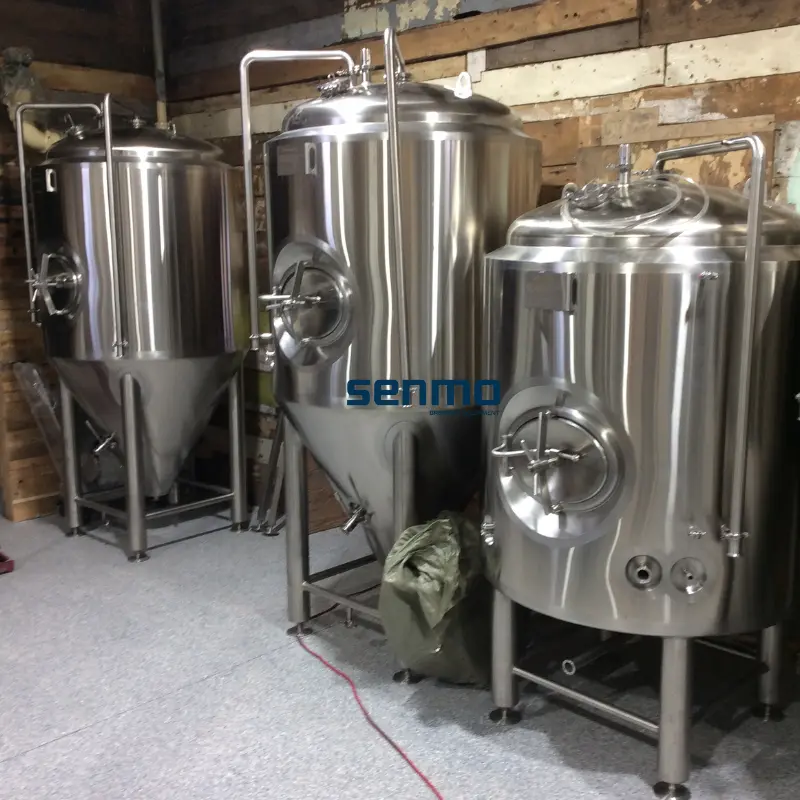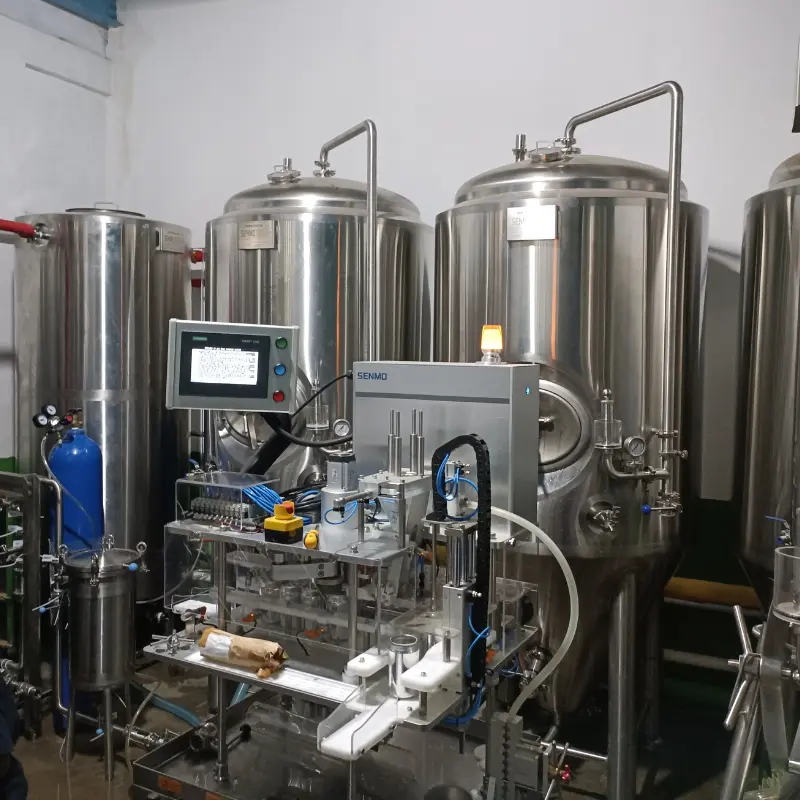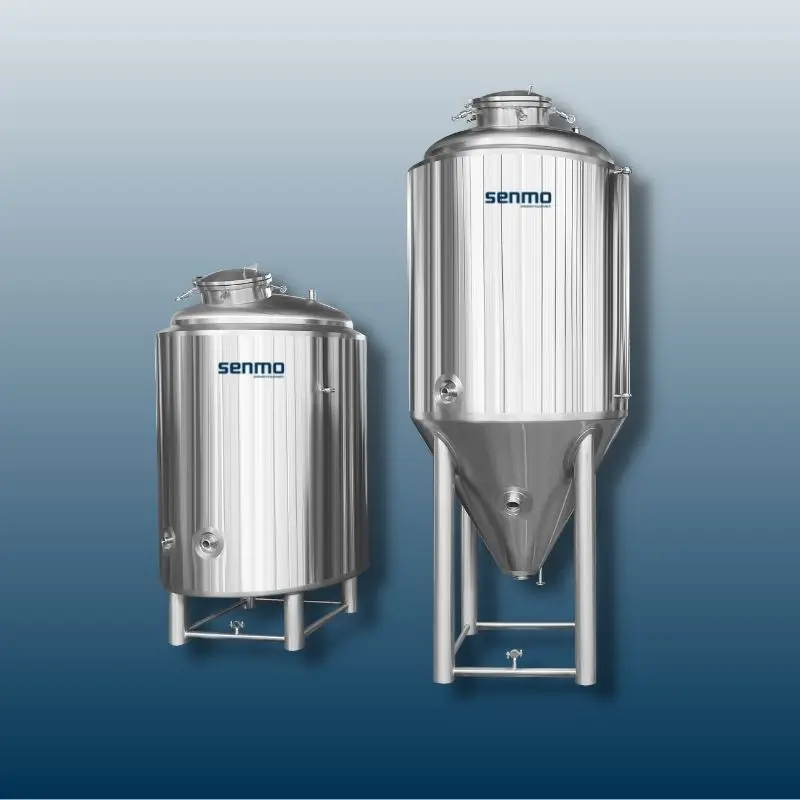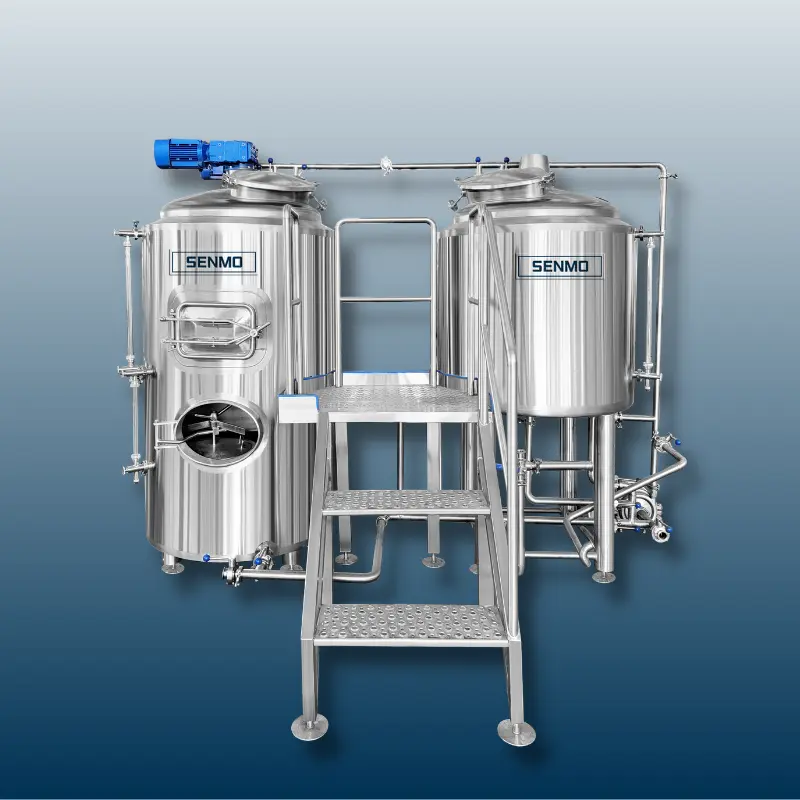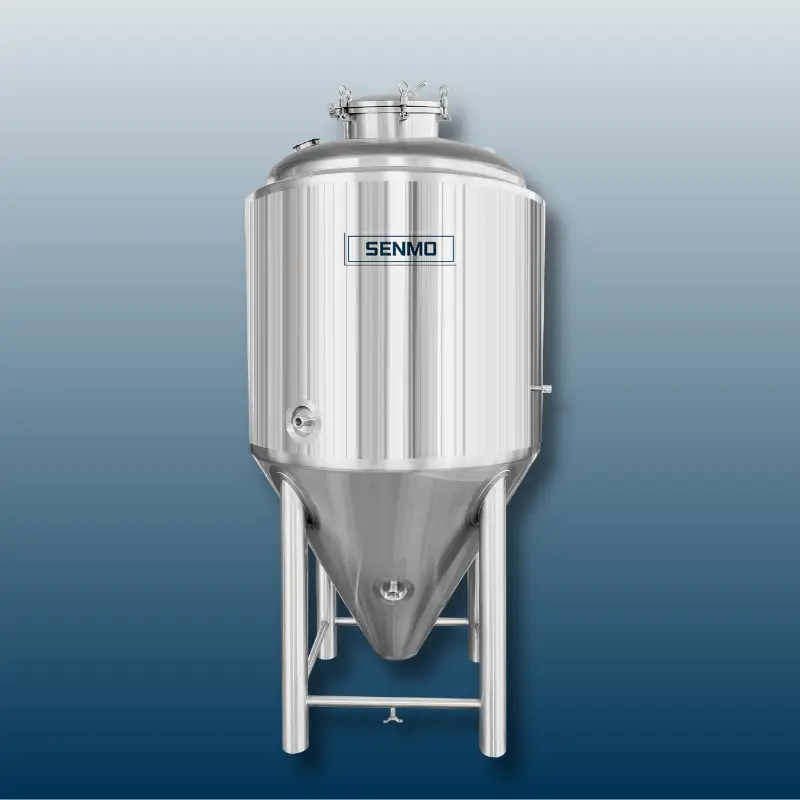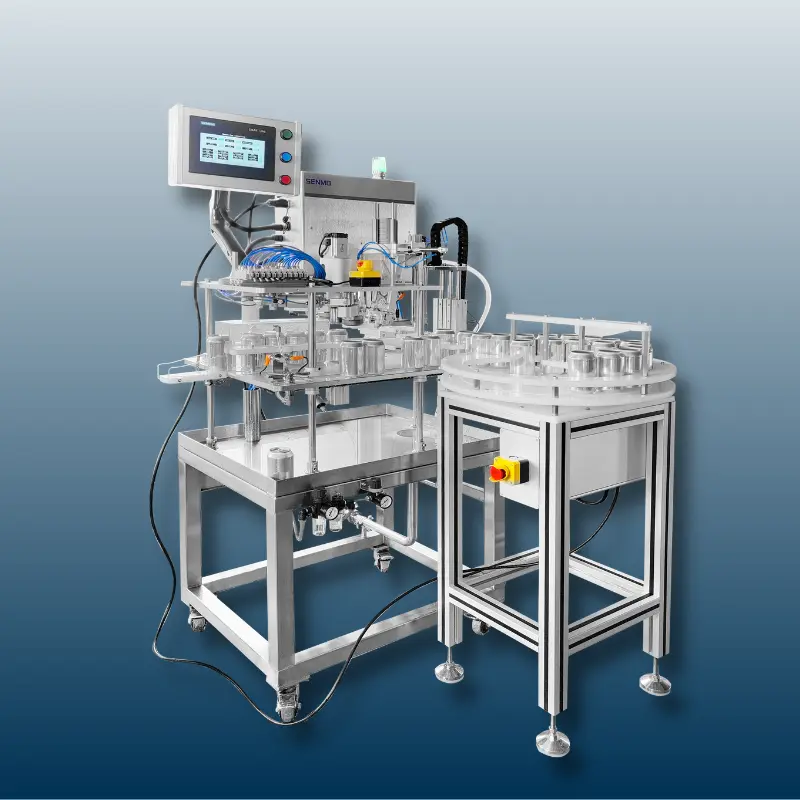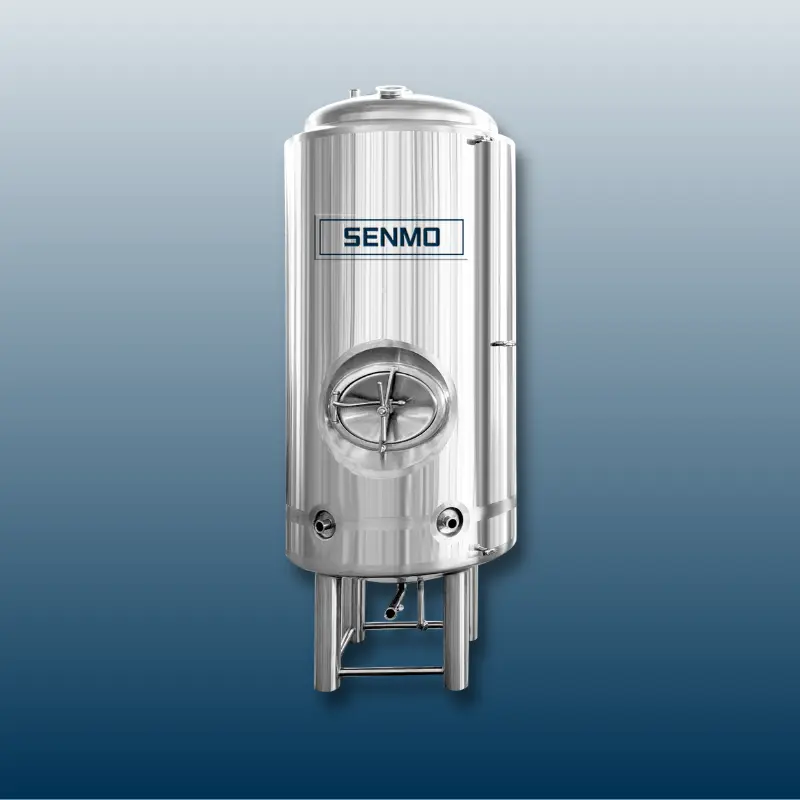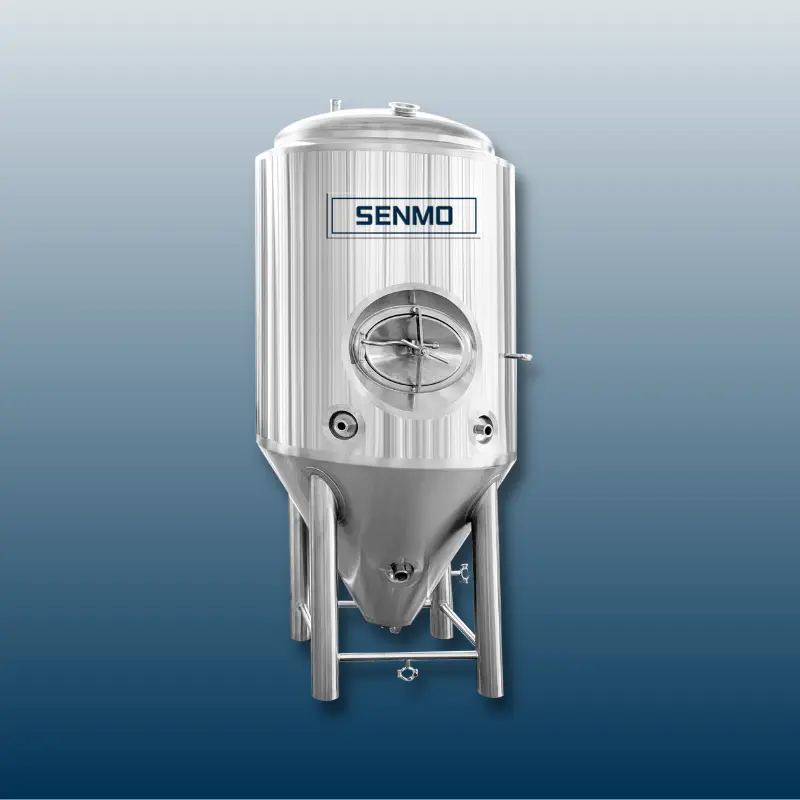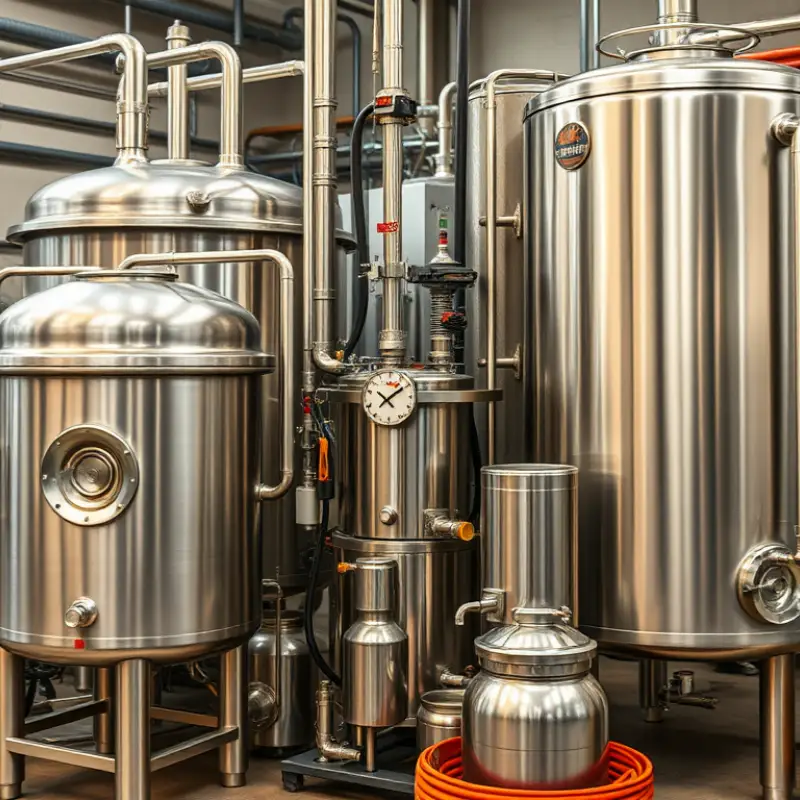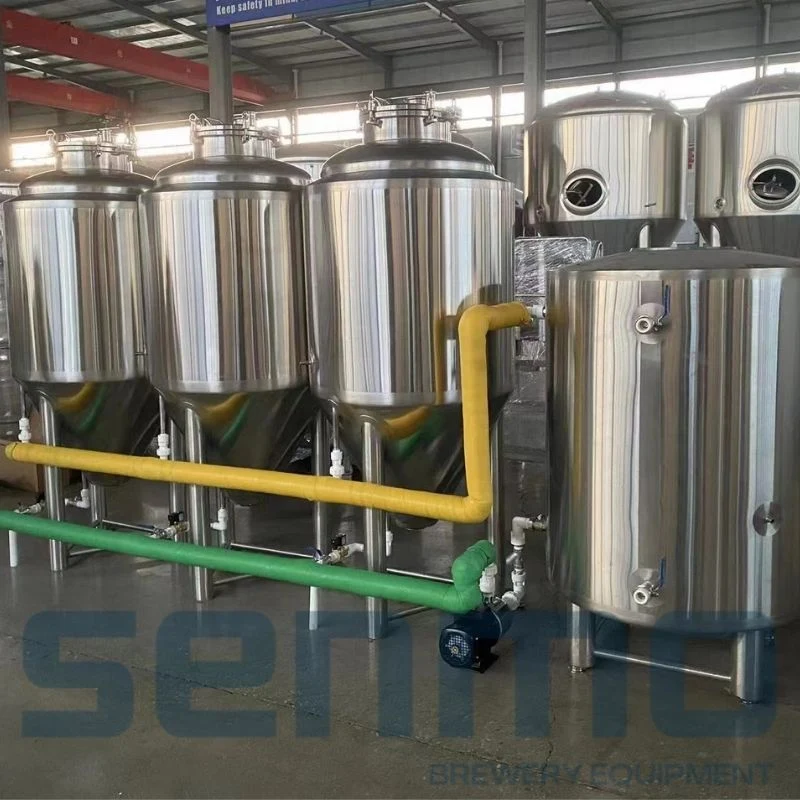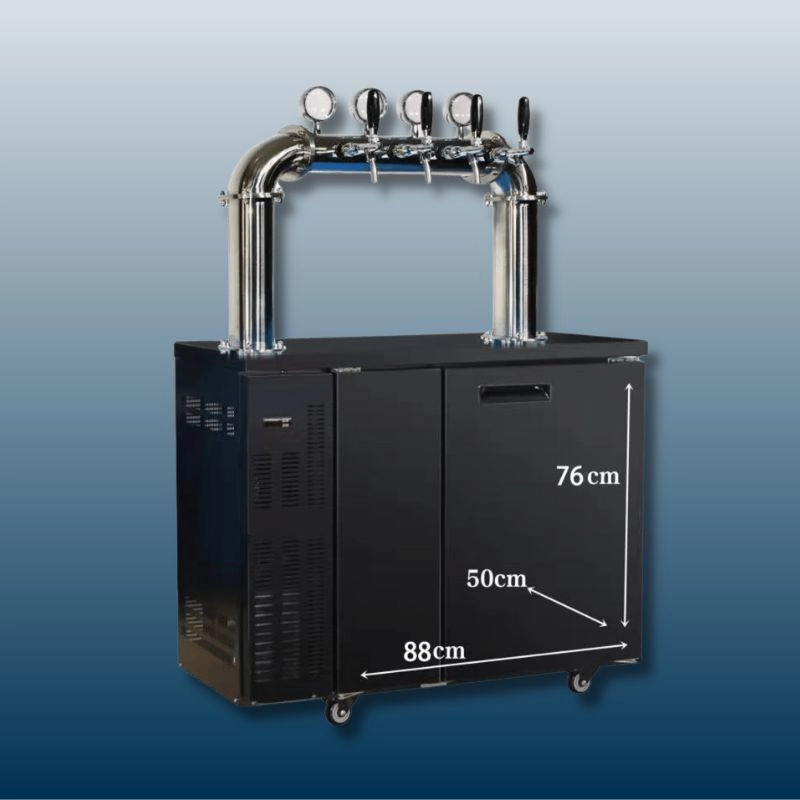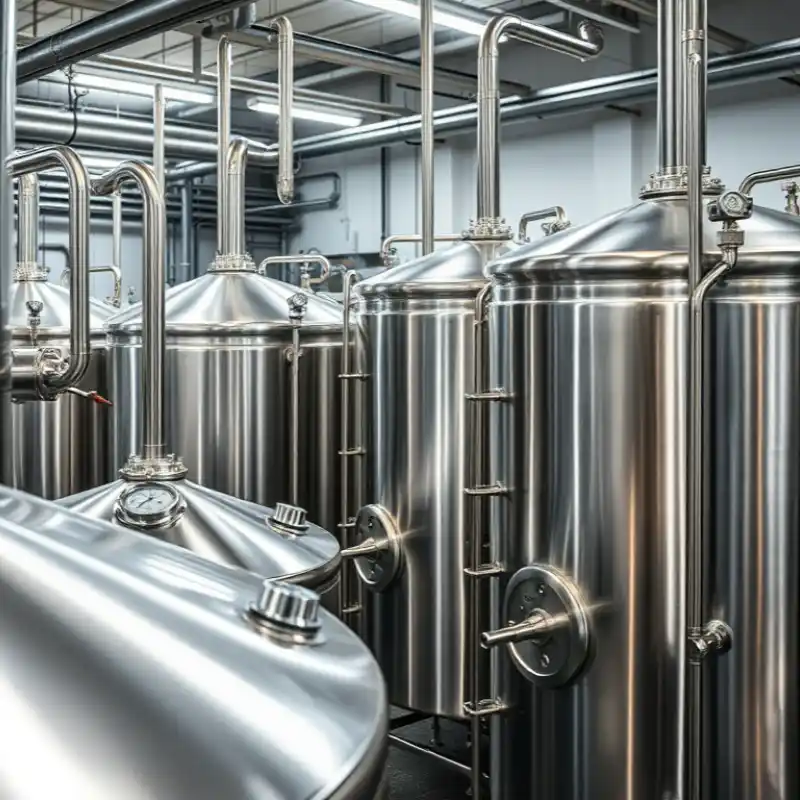2000L 20HL beer fermentation system for brewery
In the ever-evolving world of craft brewing, precision and innovation in fermentation are paramount to producing exceptional beers. Brewmasters seek equipment that not only meets their brewing demands but also elevates the craft to new heights. Today we will introduce our 2000L 20HL Beer Fermentation System.

Among the 2000L entire set of brewing equipment, the most automatic self-controlled equipment system is undoubtedly the 2000L beer fermentation system. The 2000L fermentation system is composed of 2000L fermentation tanks,the temperature and pressure in the tank can be controlled automatically.Currently, the majority of fermentation tanks are mainly conical in shape, as conical fermentation tanks are more convenient for yeast precipitation, separation, and recovery after the main fermentation. The 2000L conical fermentation tank is a closed tank,the convection intensity is related to the shape of the tank, the size of the capacity, and the control of the cooling system. Regarding the tank shape, the diameter to height ratio of a conical tank is generally 1:3-1:5. In terms of volume, the maximum capacity is more than 25% more than the effective volume.
The volume of 2000l is very suitable for a brewery. Because of this scale, it can cover multiple surrounding communities. If you are a large brewery, you can use this 2000l capacity beer equipment to make experimental new beer. Creating new profit growth points and maintaining old customers play an important role.
435666.webp)
In addition to the 2000L fermentation tank body, the fermenters also needs corresponding accessories.
Temperature sensor: During the main fermentation process, accurate temperature control and accurate temperature measurement are required. Thermometers are commonly used in home brewing equipment, while temperature sensors are commonly used in large equipment. Nowadays, computers are mostly used for temperature control in breweries.
Pressure gauge: During fermentation and wine storage, the pressure of the conical tank must be monitored.
A sampling valve, with a sampling port on the conical tank, allows beer sampling and sugar measurement at any time.
Pressure regulating valve and breathing valve are used to control the pressure inside the tank.
The cleaning ball is used for cleaning the fermentation tank before and after use.
Dry hops are used to add new hops to the wine at the later stage of fermentation.
For a brewery, what is needed is not a certain equipment of the unit, it must be a beer brewing system with a volume of 2000l. Through the above introduction, its beer preparation link is very complete.

The PLC control panel of the 2000L fermentation system,there are temperature sensor in inside of the fermenters,the signal can be reflected on the screen.Meanwhile,the brewers can set the temperature by touching the screen,all of the fermenters' temperature can be set and displayed through it.

STANDARD 2000L beer fermenters FEATURES
▪SS Dished head
▪Butterfly valves, Sample valve,PVRV
▪Clamps and gaskets, pressure gauge
▪Interior shell: 304 stainless steel, thickness 3mm
▪Exterior shell: 304 stainless steel, thickness 2mm
▪Interior and exterior finish polished to a sanitary finish
▪Interior finish pickled and passivation
▪Dimple jacket cooling jackets
▪Exterior brushed finish
▪Fully welded exterior shell
▪60 degree cone bottom, with an average of 25% head space
▪Rotating racking port
▪Side/Top manway door
▪Dual zone dimple cooling jackets (3 or more on larger tanks)
▪2'' Polyurethane insulation
▪CIP arm and spray ball with a molding technology
▪Sanitary tri-clamp connections
▪Upgrade drain port size
▪Dry hop port

Price:
The pricing of a 2000L (20HL) beer fermentation system can vary based on several factors, including the brand, material quality, additional features, and country of origin. On average, the price range for a reliable and well-equipped system can start from approximately $50,000 and go up to $100,000 or more, depending on specific requirements and customization options.
The price of the 2000L beer fermentation system is various because of the different configuration of the fermenters.If you plan to add extra 2000L fermenters for your breweries,please contact with us and send us your requirements such as the quantity of the fermenters,the configuration of the tanks,your brewery space layout.Our sales engineer can give you a professional quote of the fermenters.
For example, a growing craft brewery called "HopWorks Brewing Co." Decided to invest in a 2000L (20HL) beer fermentation system to meet the growing demand for their unique beer products. They chose a system consisting of four stainless steel fermenters, each with a capacity of 2000 liters.
HopWorks Brewing Co. benefits from the system's advanced temperature control and automation features. They set an ideal fermentation temperature for their flagship IPA, usually around 18°C (64°F). The system's temperature probe and glycol cooling jacket ensure precise temperatures are maintained throughout the fermentation process for optimal yeast performance and consistent flavor profiles.
Additionally, the pressure control capabilities of the fermenters allow HopWorks Brewing Co. to produce a variety of styles of beer, including lightly carbonated Belgian white beers. They utilize the system's pressure relief valve and pressure control system to regulate the level of carbonation during fermentation, resulting in a refreshing and effervescent end product.
By integrating a 2000L (20HL) beer fermentation system into their line, HopWorks Brewing Co. not only increased their brewing capacity, but also ensured consistent quality across their expanding product line. The investment in this highly efficient fermentation system allows them to meet customer needs, explore new beer styles, and strengthen their position in the highly competitive craft beer market.
In conclusion:
The 2000L (20HL) beer fermentation system is a valuable asset for breweries looking to increase production efficiency and scale up operations. With its large fermentation capacity, durable stainless steel construction, precise temperature and pressure control, and automation features, the 2000L (20HL) beer fermentation system provides breweries like HopWorks Brewing Co. with the tools they need to produce high-quality beer consistently.
While the initial investment for a 2000L (20HL) beer fermentation system can be significant, the long-term benefits outweigh the cost. Breweries can increase their production volume, meet growing customer demands, and explore new beer styles and flavors. The system's temperature and pressure control mechanisms ensure that the fermentation process is optimized, resulting in consistent taste and quality. Additionally, the system's automation and monitoring capabilities enable brewers to maintain greater control and efficiency in the brewing process.
It is important for breweries considering the purchase of a 2000L (20HL) beer fermentation system to evaluate their specific needs and requirements. Factors such as budget, available space, production goals, and customization options should be taken into account. Researching reputable suppliers, comparing prices and features, and seeking recommendations from industry professionals can help breweries make an informed decision.
In conclusion, the 2000L (20HL) beer fermentation system offers breweries a reliable and efficient solution to increase production capacity and maintain quality standards. Breweries like HopWorks Brewing Co. can benefit from its features, such as precise temperature and pressure control, automation, and scalability. By investing in this fermentation system, breweries can enhance their brewing operations, meet market demands, and continue to delight beer enthusiasts with their craft.
FAQ
Q1: What is the optimal capacity of the 2000L 20HL Beer Fermentation System, and why is it suitable for breweries?
A1: The 2000L 20HL capacity strikes a balance between efficiency and production scale. It is suitable for breweries aiming to meet demand without compromising the quality of the beer, providing a substantial fermentation volume for crafting a variety of brews.
Q2: Why is stainless steel construction important for this fermentation system?
A2: Stainless steel construction ensures durability and longevity. Stainless steel is corrosion-resistant and easy to clean, maintaining the purity of the brew and guaranteeing a reliable and robust brewing process.
Q3: What role do conical fermentation tanks play in the 2000L 20HL system?
A3: Conical fermentation tanks facilitate the settling of yeast and other sediments. This design ensures a cleaner and more efficient fermentation process, contributing to the clarity and quality of the final beer.
Q4: How does the 2000L 20HL system achieve precision in temperature control during fermentation?
A4: The system incorporates advanced temperature control mechanisms to maintain precise fermentation temperatures. This precision is crucial for yeast activity and flavor development, ensuring consistency in each batch.
Q5: Does the 2000L 20HL system have pressure fermentation capability, and how does it benefit brewers?
A5: Yes, some systems are designed to withstand pressure, allowing for pressure fermentation. This technique influences carbonation levels and yeast performance, providing brewers with additional avenues for experimentation and flavor manipulation.
Q6: Does the 2000L 20HL system feature automated monitoring and control?
A6: Yes, modern brewing demands sophisticated control systems, and the 2000L 20HL system often includes automated monitoring and control features. This enables brewers to oversee and adjust fermentation parameters with precision, streamlining the brewing process.
Q7: How does the system facilitate yeast harvesting and sampling?
A7: Convenient features such as bottom valves are integrated into the system for yeast harvesting and sampling. Brewers can easily collect yeast for reuse in subsequent batches and take samples for quality checks without disrupting the entire fermentation process.
Q8: Is the 2000L 20HL system scalable for growing breweries?
A8: Yes, the system is designed with scalability in mind. As demand increases, breweries can seamlessly expand their production capacity without compromising on the efficiency and quality of the fermentation process.

359.webp)





